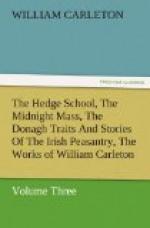It was upon the advent of one of those festivals—Christmas—which the family of M’Kenna, like every other family in the neighborhood, were making preparations to celebrate with the usual hilarity. They cleared out their barn in order to have a dance on Christmas-eve; and for this purpose, the two sons and the servant-man wrought with that kind of industry produced by the cheerful prospect of some happy event. For a week or fortnight before the evening on which the dance was appointed to be held, due notice of it had been given to the neighbors, and, of course, there was no doubt but that it would be numerously attended.
Christmas-eve, as the day preceding Christmas is called, has been always a day of great preparation and bustle. Indeed the whole week previous to it is also remarkable, as exhibiting the importance attached by the people to those occasions on which they can give a loose to their love of fun and frolic. The farm-house undergoes a thorough cleansing. Father and sons are, or rather used to be, all engaged in repairing the out-houses, patching them with thatch where it was wanted, mending mangers, paving stable-floors, fixing cow-stakes, making boraghs,* removing nuisances, and cleaning streets.
* The rope with which a cow is tied in the cowhouse.
On the ether hand, the mother, daughters and maids, were also engaged in their several departments; the latter scouring the furniture with sand: the mother making culinary preparations, baking bread, killing fowls, or salting meat; whilst the daughters were unusually intent upon the decoration of their own dress, and the making up of the family linen. All, however, was performed with an air of gayety and pleasure; the ivy and holly were disposed about the dressers and collar beams with great glee; the chimneys were swept amidst songs and laughter; many bad voices, and some good ones, were put in requisition; whilst several who had never been known to chaunt a stave, alarmed the listeners by the grotesque and incomprehensible nature of their melody. Those who were inclined to devotion—and there is no lack of it in Ireland—took to carols and hymns, which they sang, for want of better airs, to tunes highly comic. We have ourselves often heard the Doxology sung in Irish verse to the facetious air of “Paudeen O’Rafferty,” and other hymns to the tune of “Peas upon a Trencher,” and “Cruskeen Lawn.” Sometimes, on the contrary, many of them, from the very fulness of jollity, would become pathetic, and indulge in those touching old airs of their country, which maybe truly,called songs of sorrow, from the exquisite and simple pathos with which they abound. This, though it may seem anomalous, is but natural; for there is nothing so apt to recall to the heart those friends, whether absent or dead, with whom it has been connected, as a stated festival. Affection is then awakened, and summons to the hearth where it presides those on whose face it loves to look;




